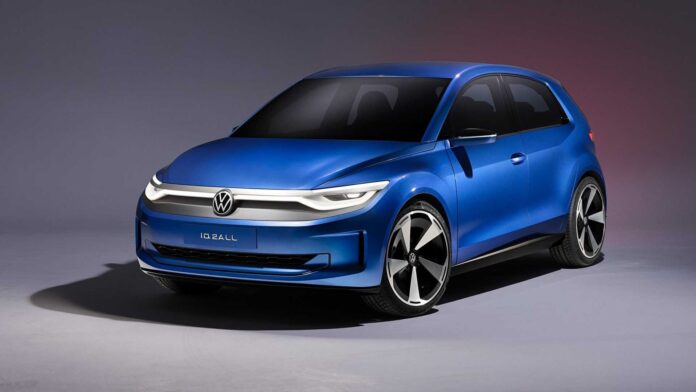
- The Volkswagen ID.2 will be introduced in 2026, with lithium-iron-phosphate (LFP) batteries, which tend to be cheaper than other chemistries.
- The brand will implement LFP battery tech through the whole MEB lineup, including the ID.3, ID.4 and ID.7.
- This new platform will be called MEB Plus.
Volkswagen has been trying to adjust its EV aspirations. It may have stumbled out of the gate with the middling ID.3 and ID.4, and its flailing software arm, but it really is trying to right the ship here. It’s partnered with Xpeng and Rivian for better in-car software, while continuously updating its product line. VW’s most anticipated model, the reasonably priced ID.2, is on its way soon. That model will introduce some major changes that’ll spread to the rest of the Volkswagen lineup, one report claims.
According to Autocar’s latest conversation with VW, ID.2 will mark the start of the brand porting its whole model lineup to new platform that is cheaper to make. The platform will be called MEB Plus, an evolutionary name that pushes the standard MEB platform forward.
The biggest change on MEB Plus versus MEB is the newer platform’s use of lithium-iron-phosphate (LFP) battery cells. The tech may be slightly down on energy density compared to the nickel-manganese cobalt (NMC) cells widely used by Western automakers currently, but LFP batteries are cheaper. That’s why they’re far more popular in China. The ID.2 will have LFP cells, but VW says that the tech will come to the rest of VW’s MEB models not long after the ID.2’s introduction. This means that the ID.3, ID.7 and—most pertinently for those in the U.S.—the ID.4 could get a lot cheaper here. The shift to LFP will also come with full design overhauls on its EVs.
LFP batteries are becoming increasingly important in the EV realm. In China, they’re becoming fairly common in even premier fast-charging vehicles, like Zeekr’s Golden Battery. Here in the U.S. brands like Ford, GM and Tesla have embraced the tech as a way to cut costs among their existing models. LFP is part of the reason why the Chevy Bolt EV will be able to come back at a similar price.
It’s not clear how MEB plus will factor into Volkswagen’s U.S. plans. Autocar claims that VW’s new Salzgitter, Germany plant will supply LFP packs for the refreshed models, and a few NMC packs for the outgoing models that will need them. But, as the IRA faces a significant reorganization, it’s not clear if we U.S. battery manufacturing will grow as quickly as in the rest of the world.
Could VW even sell a foreign-made battery in its U.S. EV offerings without significant hardship? Perhaps it would it be forced to figure out where it could get these cells for U.S. consumption. Things are very much in the air here, and we just won’t know until it happens. We already know that the ID.2 is likely a no-go for the U.S., unfortunately.
The Volkswagen ID.2 and the brand’s full EV overhaul are expected to start in 2026. Hopefully by then we’ll have some more clarity here.
Contact the author: Kevin.Williams@InsideEVs.com


